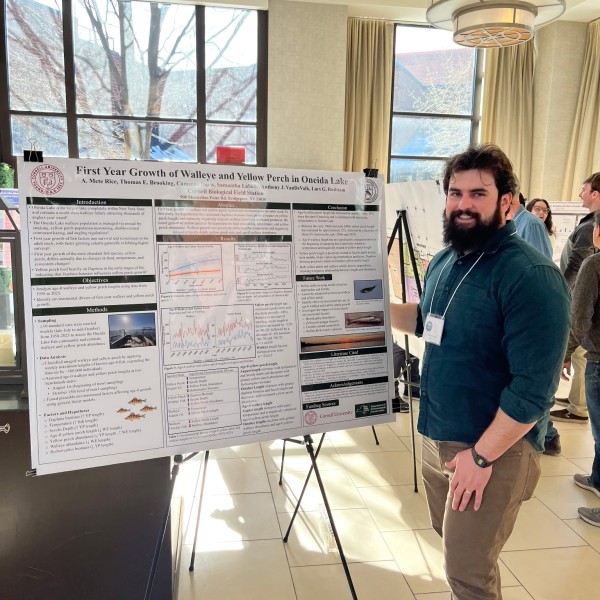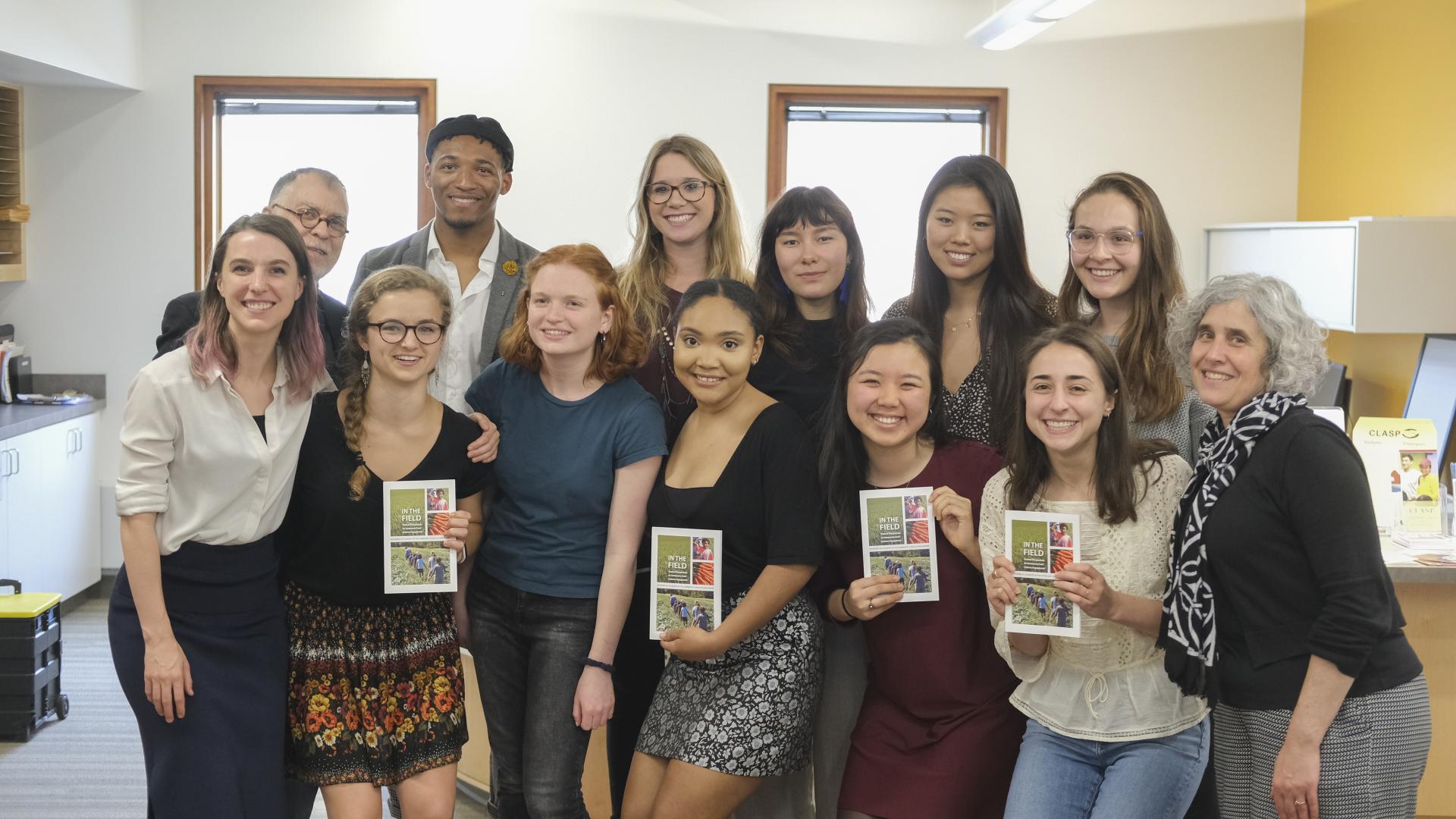How Maya Chang Matunis ‘20 advocates new understandings of food systems
As an undergraduate with a passion to help humanize the mechanics of food systems, Maya Chang Matunis ‘20 utilized the Community Food Systems minor to study complex puzzles of food and human life. From an internship with the Cornell Farmworker Program to now preserving stories of food justice and urban farming in New York City, this Brooklyn native is advocating for a food system that acknowledges and respects the role of local farmers and communities.
Food justice animates your work and your education. Why did you decide to study food justice at Cornell?
I first formally encountered the concept of food justice my sophomore year at Cornell, when I experienced a serious a-ha moment, uncommon in an 8:40am lecture. At that point, I had been pursuing a degree in nutrition, but this suspicion that something fundamental was missing in my academic engagement with food made me hungry (pun shamelessly intended) for something I couldn't yet name. I was searching for the vocabulary to begin to articulate and understand the complex intersectionalities of food and human life. The Community Food Systems (CFS) minor provided the intellectual dynamism I craved. Through CFS I was able to explore food as an entry point to the ecological, sociopolitical, economic, and psychological structures that scaffold the human experience.
What kind of community engagement did you get with your CFS minor?
I spent a summer working with the Cornell Farmworker Program in Upstate New York engaging with unauthorized farmworkers and their families. My internship involved organizing know-your-rights and workplace conflict mediation workshops on dairy farms, conducting interviews to prepare materials for pro-bono immigration attorneys, and assisting with translation and logistics at mobile consulate visits. More than anything else, my time with the Cornell Farmworker Program was a crash course in humility, forcing me to address my assumptions about community engagement.
The work I did wasn’t always glamorous or heroic, but this kind of on-the-ground rather than theoretical engagement had an enormous impact on me. I learned that in community-based advocacy work, “success” is not often easily identifiable or immediately gratifying.
For example, as I spent an afternoon making scans of folks’ Guatemalan passports to help them update their identification documents, I remember thinking, I wonder how much of a difference this is actually going to make. Sometimes, like when one of the young people I met was deported or with the onslaught of news about the horrific conditions in the detention centers at the border, it seemed that the small things were never going to be enough. At the same time, I was able to see that the very existence of an organization like the Cornell Farmworker Program makes a huge difference, letting farmworkers know that they are valued and that there are people who will stand in solidarity with them. I am fortunate to have had the opportunity to ground my food systems education within both the triumphs and losses of this high-stakes work.

What is one of your favorite memories from the minor?
After completing my practicum, my cohort and I spent two semesters authoring a book titled ‘In the Field: Student Perspectives on Community Food Systems Engagement’. I worked with my peers to make sense of the thorny, untidy stories we had gathered during our practicums, stitching them together to tell a truth about our place within the food system. One of my favorite moments of this project was our brainstorming session to develop the overarching organization of the book. We had our ideas mapped on an enormous whiteboard, with lines in red marker connecting our thoughts like a detective’s wall in a crime show. While writing the book (I also had a great time doing the illustrations throughout!) I was encouraged to view my own experience as a valid informant. The confidence I gained from that project has proven indispensable as I navigate life beyond Cornell.
How did your time in the minor impact your career path?
I am focused on pursuing a career in community archives and public history, as well as continuing to write. My aspirations build upon an understanding of storytelling as a revolutionary practice, informed by my time in the CFS minor. For me, the ability to control the narrative of one’s own history and sovereignty over one's own food system is linked in ideology and in practice. These two interests have recently intersected in my work with Interference Archive to develop a mobile exhibit on Urban Farming and Food Justice in New York City. I am also currently the Curatorial Intern at the Georgia Writers Museum, working on a project to document the lives and work of the 69 members of the Georgia Writers Hall of Fame. I see a lot of overlap between this work and my time in the minor.
My experience in the Community Food Systems minor trained me to look for the tangled roots underlying what appears deceptively straightforward. Cornell Global Development encouraged me to center the values of lived experience and community as primary sources of knowledge in my work.
What was your favorite class and/or professor and why?
These answers are going to reveal how nerdy I am.
I loved Professor Makki’s notoriously reading-heavy Theories of Society and Development class. So much of what I had encountered of sociological theory before that class was other scholars interpreting the canon’s seminal texts. It really gave me a lot of confidence in my academic capabilities to delve into the primary source material and make sense of it myself.
I also adored Professor Taiwo’s Ethics and Society: Aid and its Consequences. Professor Taiwo is an absolute joy and is so knowledgeable that it seems unfair. The course should be required for every “well-meaning” human living in colonizer countries.
And of course, I think it’s important to take advantage of classes that are outside of your usual area of study. Two of my all-time favorite courses were Introduction to Japanese Cinema with Professor Campana and Punk Culture with Professor Peraino. As Frida Kahlo says: “It is not worthwhile to leave this world without having had a little fun in life.”
About the author
Maya Chang Matunis '20
Maya Chang Matunis ‘20 graduated with a major in Development Sociology and minors in Community Food Systems and Inequality Studies. Her passion to tell stories and promote equitable food systems has led to work with the Interference Archive in NYC, as a Community Organizer with Food and Medicine in Eastern Maine, and as the Curatorial Intern at the Georgia Writers Museum. Maya is inspired by punk rock, her super cool grandparents, cooperative living, the Atelier Populaire and regularly rewatching the documentary “Toni Morrison: The Pieces I Am.”

Keep Exploring

Field Note
- Dairy Fellows Program
- Animal Science
- Agriculture

News
- Biological Field Station
- Ashley School of Global Development and the Environment
- Natural Resources and the Environment Section

We openly share valuable knowledge.
Sign up for more insights, discoveries and solutions.


